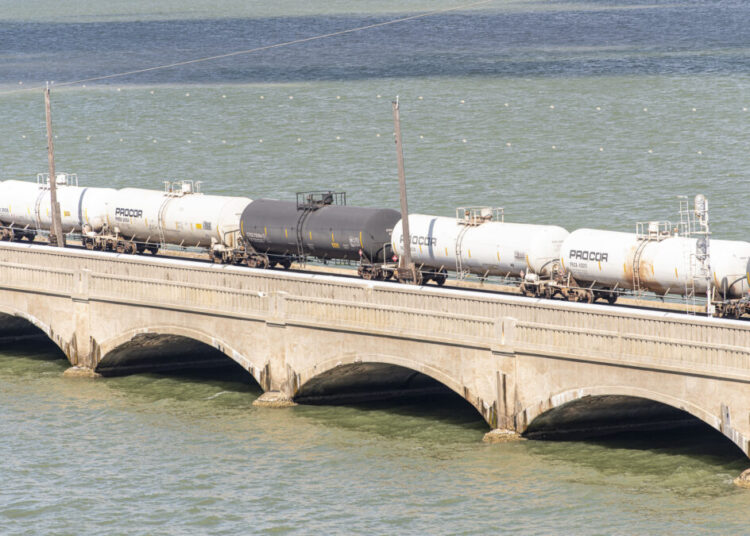The Federal Railroad Administration (FRA) plans to audit the safety cultures and practices of all the Class I railroads operating in the U.S., according to a recent letter by FRA Administrator Amit Bose.
FRA’s review will include assessments of the safety culture, practices and compliance of individual railroads, as well as a final report that will address safety themes and trends in the industry overall, according to Bose’s letter to Sen. Chuck Schumer, D-N.Y.
These plans come as FRA said Friday that it is asking the railroads to evaluate their processes for monitoring and measuring the health of journal bearings.
Since the Feb. 3 derailment of a Norfolk Southern train in East Palestine, Ohio, federal and state lawmakers have been urging reforms to bolster rail safety. As a result, bipartisan legislation on rail safety is awaiting further action on the Senate floor.
Schumer, Senate majority leader, also pressed Bose and the CEOs of the Class I railroads to come up with ways to improve rail safety.
“Although FRA does not directly regulate a railroad’s safety culture, each assessment report will note the strong aspects of a railroad’s safety culture and recommend changes where there are opportunities for improvement,” said Bose’s June 1 letter. “Each Class I railroad will be asked to develop corrective actions in response to FRA’s recommendations, and FRA will track those to completion.”
FRA also recently completed field work for its assessment of NS’ (NYSE: NSC) safety culture, practices and compliance, and a report on its findings will be coming soon, according to Bose.
In a related move, the National Transportation Safety Board recently announced it would hold field hearings June 22-23 on the NS train derailment. The hearings will occur in East Palestine and will focus on four issues: emergency responses; the decision to vent and burn five tank cars carrying vinyl chloride; freight car bearing failure modes and wayside detection systems; and tank car derailment damage and issues related to crashworthiness and hazardous materials.
Scrutinizing train lengths and transport of hazardous materials
Bose addressed two other questions that Schumer raised: one on the effect of longer train lengths on safety and the other on the transport of hazardous materials.
Regarding longer trains, the FRA administrator pointed to two recent safety advisories: one on the operational complexities involved in running longer trains and another on train makeup and building trains.
Bose also cited plans for additional studies, which were called for by the Infrastructure Investment and Jobs Act and will be completed in 2024. One is for FRA to study air brake system performance and the resulting train dynamics of trains up to 200 cars in length. The other is for the National Academies of Sciences, Engineering and Medicine to study the impacts of trains longer than 7,500 feet.
As part of FRA’s study, the agency is collecting data on the lengths of trains involved in reportable accidents and the size of the locomotive’s train crew in each of those accidents.
For the transportation of hazardous materials by rail, FRA routinely inspects hazmat rail cars and enforces related regulations, Bose told Schumer. A study is also underway looking at the routes nationwide where trains hauling highly hazardous flammable trains travel. That study’s purpose is to evaluate the overall condition of infrastructure, including equipment used to transport hazmat as well as railroads’ compliance with federal regulations, Bose said.
A rail safety advisory committee affiliated with FRA and made up of people in the industry is also looking at whether to expand the definition of high-hazard freight trains and look at their train configurations, he said.
FRA is working with the short-line railroads to ensure their safety performance, according to Bose.
Assessing processes used to evaluate journal bearings
In a separate action, FRA said Friday that it wants the freight railroads to evaluate the resiliency and accuracy of the processes they use to monitor and measure bearing health.
This recommendation is in addition to other recommendations FRA provided in a safety advisory in March that addressed the use and maintenance of hot bearing detectors (HBD), FRA said.
“FRA notes that the process of gathering, monitoring, reporting, analyzing, and actioning information from detectors includes tasks that, if incorrectly done, can introduce risk,” FRA said. “For instance, an error in HBD installation or maintenance that is not identified by commissioning testing may impact the reporting of HBD measurements. Similarly, processes with insufficient redundancies or cross-checks to ensure each necessary step or task is performed timely and accurately may lead to failures in the processes that allow a valid detector alert or alarm to go undetected.
As a result, FRA is asking the railroads to evaluate which steps and tasks could result in incorrect decisions when personnel are responding to a report from an HBD. After the railroads have identified these areas, the agency is also recommending that the railroads implement safeguards that could minimize the impact of failures that aren’t able to be detected by HBDs.
The new recommendation is pending publication in the Federal Register.
Subscribe to FreightWaves’ e-newsletters and get the latest insights on freight right in your inbox
Click here for more FreightWaves articles by Joanna Marsh.
Related links:
FRA proposes rules for certifying train dispatchers, signal employees
Federal Railroad Administration urges caution on train lengths
FRA links train configuration to 6 derailments, issues safety advisory
NTSB and FRA to scrutinize Norfolk Southern’s ‘safety culture’
Ohio train derailment spurs rail safety advisory on hot box detectors
Buttigieg: Expect more federal regulation on rail safety
The post Federal regulators plan broad safety review of all Class I railroads appeared first on FreightWaves.














